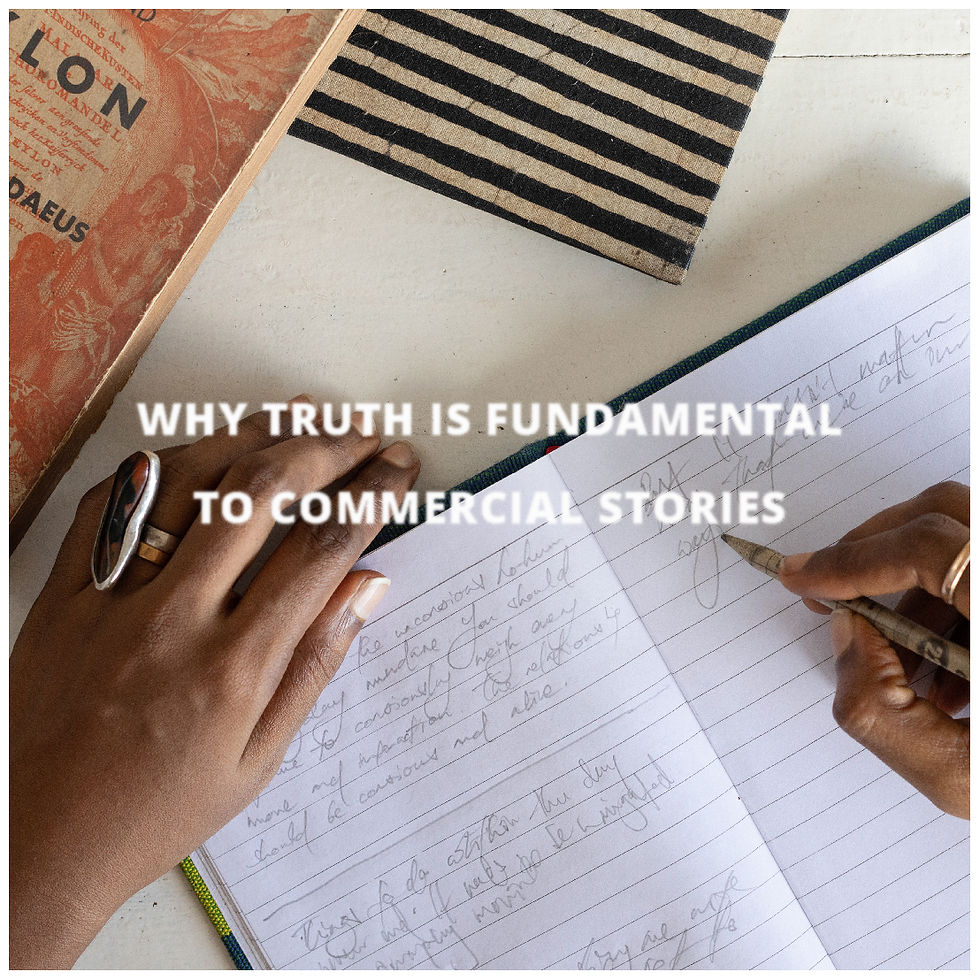Why truth is fundamental to commercial stories
- Shamalee de Silva Parizeau

- Nov 29, 2023
- 4 min read
Updated: Mar 10, 2024

The trust that a business cultivates with its audience has a lot to do with the truthfulness in the stories that it tells. Especially now, in our age of misinformation driven into hyperdrive with deep fakes. From my experience in designing stories for business, I’ve understood that truth is fundamental. It’s the basis of a good business story that forms a real connection between businesses and people.
Remember a good story told by a business that led you to forming a connection with that brand; it either tapped into your desires, fears, anxieties, comforts, amusements, or aspirations by offering solidarity, by resonating with you or by providing a solution. But, imagine if you later found out this story was not exactly factual; it would most likely alter your entire perception of that business. Why, though? Why isn’t an untrue business story easily acceptable as fiction, like we would embrace a movie or a comedy skit? This is where context is everything in a story. People generally associate a business story with reality; a product or a service they can use. Unless stated, or presented through the work of an artist, performer, or an influencer whose stories are known to be fictional, business stories live in the context of reality where truth is imperative. For example, see how we set the context for this fictional story for a client. Also see this funny story that needed no explicit context because audiences already recognise the work of these creators as fiction.
However, the product qualities or values told in a fictional story by a business must still be true. For example; in a campaign video that went viral, tech giant Apple’s team, including CEO Tim Cook, is portrayed having a meeting with Mother Nature played by Oscar-winning actress Octavia Spencer. In a compelling narrative, Apply cleverly uses a formidable Mother Nature’s demand for sustainability updates to talk about the company’s innovations across materials, clean energy, and low-carbon shopping as well as its work in restoring natural ecosystems. The story ends with Mother Nature being pleasantly surprised, as Apple successfully presents itself as on track to meet targets for its 2020 pledge to reach net zero across Apple’s entire carbon footprint by 2030. The story also doesn’t miss the opportunity to unveil its first carbon-neutral product, an eco-friendly Apple Watch. This story has won Apple admiration for transforming a boring sustainability report into something that has humor, entertainment, and facts while also achieving what all companies want with their content—going viral. It’s genius storytelling. Or, is it? The story has also created significant backlash bringing the spotlight to Apple’s already existing reputation for creating products that quickly become obsolete and limiting the ability to repair—both highly unsustainable policies. This has led to accusations of greenwashing and dismissal of Apple’s sustainability claims; unfortunately, even the ones they uphold. This is a case that highlights the importance of making communication not only interesting but also authentic. In the long run, honesty is at the core of stories that build trust. Brands should proudly claim their victories while being honest about their shortcomings and what they’re still working on. For brands that prioritize longevity and build a legacy of reliability over short-term profits and virality, honesty is key when it comes to communication.
Truth is fundamental to business stories; it’s non-negotiable. Even in entertainment, where fiction is a norm and readily welcomed by audiences, truth holds enormous value. Just think about the weight it adds to the value of a story when you read the line ‘this story was based on a true incident’ at the end. Truth is so valuable; never, ever compromise or downplay it in business stories.
When a brand is truthful in its communication, it establishes credibility. Consumers grow to trust a brand that doesn't mislead, change narratives, or overpromise. This means transparent communication about products, services, and business practices; it builds trust because consumers always appreciate more knowledge and a deeper understanding of their purchases.
Honesty in branding and business communication is not just a moral or ethical consideration; it's a strategic one. It builds trust, credibility, and loyalty, ultimately contributing to a brand's long-term success and financial growth.
Truth is one of the most fundamental aspects of a good business story; but, there’s more to building a successful conversation between a business and its audience. We always encourage clients to tell true stories, or present truth through the entertainment of fiction; this paired with conscious intention that comes from your company’s values, a rational relevance built to your audience through the message, and the ritual consistency of a well-rounded brand personality, language, voice, and tone maintained right throughout can form a great connection with between a business and its audience. Without these elements, your brand stories will also remain lost in the digital noise, deleted unread from inboxes, or overlooked on the feed. To find out how we can help your business tell its real story in ways your audience can draw value from it, get in touch.


